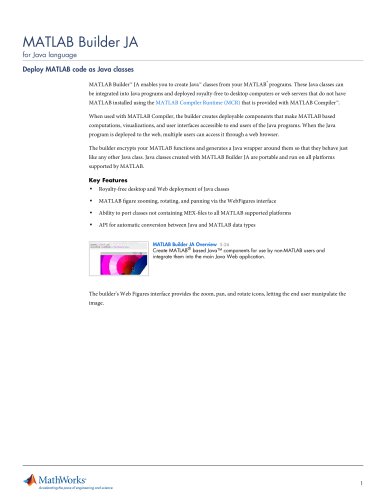
Catalog excerpts
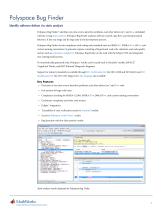
Identify software defects via static analysis Polyspace Bug Finder™ identifies run-time errors, data flow problems, and other defects in C and C++ embedded software. Using static analysis, Polyspace Bug Finder analyzes software control, data flow, and interprocedural behavior. It lets you triage and fix bugs early in the development process. Polyspace Bug Finder checks compliance with coding rule standards such as MISRA-C , MISRA-C++, JSF++, and custom naming conventions. It generates reports consisting of bugs found, code-rule violations, and code quality metrics such as cyclomatic complexity. Polyspace Bug Finder can be used with the Eclipse™ IDE and integrated into existing build systems. For automatically generated code, Polyspace results can be traced back to Simulink models, dSPACE TargetLink blocks, and IBM Rational Rhapsody diagrams. Support for industry standards is available through IEC Certification Kit (for IEC 61508 and ISO 26262) and DO Qualification Kit (for DO-178). Support for Ada language also available. ■ Detection of run-time errors, data flow problems, and other defects in C and C++ code ■ Fast analysis of large code bases ■ Compliance checking for MISRA-G2004, MISRA-C++:2008, JSF++, and custom naming conventions ■ Cyclomatic complexity and other code metrics ■ Traceability of code verification results to Simulink models ■ Access to Polyspace Code Prover™ results ■ Bug detection with low false-positive results File Edit Run Review Options Window Help - Casesensnve Whale word' Fgmty Fie Furtcrjon ratification *. Dead code - Defects: 2 .*. Missnq or nuakd return statement ■ Defects: 1 ♦ Nrjn-nfciaired parrter - Defects: 2 Non-nt-akzed viable - Defects: 2 + Wrte without a further read - Defects: 5 -v Dynamc memory - Defects: 6 W Static memory - Defects: 5 -. 1 MISFtA-C Warnnq - CwKiq Rules: 3-17 +i 10 Arthmebc type conversions - Codnq Rules: 13 & 12 Expressions - Codhq Rutes: 5 13 Control state-merit expressions - Codnq Rules: 1 | 14 Control flow - Co*iq Rubs; 33 9-16 Functions - CooViq Rides: 13 ■■ 20 Starnlard Ijraries - Co*iq Rules: 43 ' 21 Run-tme faJures - Codnq Rules: 9 ■< Q Dedaratbns and definrions - Catfriq Rules: 139 a: 9 Irrtiafcauon - Codnq Rules: 2 '. Variable trace Local ^arable is not htiabed (type: ht 32) heal variable frit 32): Futfangg ..231-!] i Project Manager f^v, Rtisuts Manager | dataflow.c / bgg_rtcitritiabedvanable() S& return value; /* Defect: Variable may not be initialized */ efeot: Variable may not be initialized */ Static analysis results displayed by Polyspace Bug Finder. Accelerating the pace of engineering and science
Open the catalog to page 1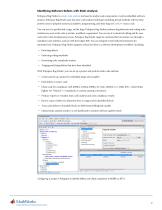
Identifying Software Defects with Static Analysis Polyspace Bug Finder is a static code analysis tool used to analyze code components or entire embedded software projects. Polyspace Bug Finder uses fast static code analysis techniques including formal methods with low false positive rates to pinpoint numerical, dataflow, programming, and other bugs in C or C++ source code. You can use it to quickly find, triage, and fix bugs. Polyspace Bug Finder performs bug detection and coding rules violations as soon as the code is written, modified, or generated. You can use it to iteratively debug and...
Open the catalog to page 2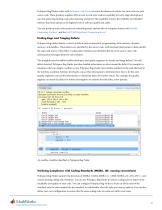
Polyspace Bug Finder works with Polyspace Code Prover to prove the absence of certain run-time errors in your source code. These products together offer an end-to-end static analysis capability for early-stage development use, that spans bug-finding, code rules checking, and proof. This capability ensures the reliability of embedded software that must operate at the highest levels of software quality and safety. You can speed up static code analysis by submitting static analysis jobs to computer clusters with Parallel Computing Toolbox™ and the MATLAB Distributed Computing Server™. Finding...
Open the catalog to page 3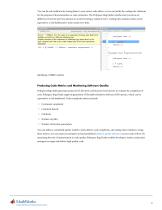
You can fix rule violations by tracing them to your source code editor, or you can justify the coding rule violations for the purpose of documentation or code comments. The Polyspace Bug Finder interface lets you focus on differences from the previous analysis to avoid reviewing a violation twice. Coding rules analysis results can be exported to a web dashboard to track results over time. Identifying a MiSRA violation. Producing Code Metrics and Monitoring Software Quality Polyspace Bug Finder generates project-level, file-level, and function-level metrics to evaluate the complexity of...
Open the catalog to page 4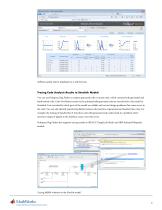
Paryipace Metncs - Window tnternrt Explorer ^ F*vo«tw -? Poryspaee Metrics < BACK 10 Proied Sel E cljort Embedded Software (Integration} fii^i-Tmc pclcda Polyspace® Metrics kt MtMS Coding Rul*i Run-Tmi CHeeki <L Local intrinel | Prawetsd Mode: Off Software quality metrics displayed via a web browser. Tracing Code Analysis Results to Simulink Models You can use Polyspace Bug Finder to analyze generated code or mixed code, which contains both generated and handwritten code. Code-level defect results in the automatically generated code are traced back to the model in Simulink. You can identify...
Open the catalog to page 5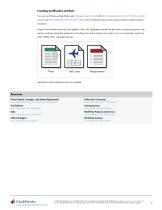
Creating Certification Artifacts You can use Polyspace Bug Finder and Polyspace Code Prover with IEC Certification Kit (for IEC 61508 and ISO 26262) and DO Qualification Kit (for DO-178B) in the certification process for projects based on these industry standards. Reports and artifacts show the final quality of the code, highlight sections that have been reviewed, generate code metrics, and document the application of coding rules and run-time error status. You can create these reports in PDF, HTML, RTF, and other formats. Certification and qualification kits are available. Resources...
Open the catalog to page 6All The MathWorks catalogs and technical brochures
-
MATLAB Production Server
6 Pages
-
Database Toolbox
4 Pages
-
MATLAB Report Generator
4 Pages
-
Stateflow
8 Pages
-
SimEvents
7 Pages
-
SimDriveline
7 Pages
-
SimHydraulics
7 Pages
-
SimPowerSystems
8 Pages
-
Simulink Control Design
5 Pages
-
Aerospace Blockset
5 Pages
-
SimRF
6 Pages
-
Simulink Coder
6 Pages
-
Embedded Coder
8 Pages
-
Simulink PLC Coder
4 Pages
-
Fixed-Point Designer
9 Pages
-
MATLAB Coder
5 Pages
-
Simulink 3D Animation
10 Pages
-
Gauges Blockset
2 Pages
-
Simulink Report Generator
3 Pages
-
global-optimization-toolbox
10 Pages
-
Phased Array System Toolbox
9 Pages
-
OPC Toolbox
5 Pages
-
Simulink Design Verifier
7 Pages
-
Simulink Design Optimization
10 Pages
-
Filter Design HDL Coder
5 Pages
-
Bioinformatics Toolbox
9 Pages
-
SimBiology
6 Pages
-
Computer Vision System Toolbox
10 Pages
-
DSP System Toolbox
11 Pages
-
Fuzzy Logic Toolbox
5 Pages
-
Polyspace Client for C/C++
5 Pages
-
xPC Target
5 Pages
-
SimMechanics
7 Pages
-
Simscape
7 Pages
-
Simulink
6 Pages
-
Data Acquisition Toolbox
8 Pages
-
Image Processing Toolbox
7 Pages
-
Signal Processing Toolbox
10 Pages
-
Control System Toolbox
6 Pages
-
Symbolic Math Toolbox?
6 Pages
-
Parallel Computing Toolbox?
7 Pages
-
MATLAB®
6 Pages
-
Mapping Toolbox 3.2
7 Pages
-
Instrument Control Toolbox
7 Pages
-
Optimization Toolbox 6.0
14 Pages
Archived catalogs
-
MATLAB Release Notes
505 Pages
-
C and Fortran API Reference
263 Pages
-
External Interfaces
649 Pages
-
Function Reference: Volume 3 (P-Z)
1696 Pages
-
Function Reference: Volume 2 (F-O)
1568 Pages
-
Function Reference: Volume 1 (A-E)
1298 Pages
-
Creating Graphical User Interfaces
520 Pages
-
3-D Visualization
212 Pages
-
Graphics
667 Pages
-
MATLAB Programming Tips
66 Pages
-
Programming Fundamentals
840 Pages
-
Data Analysis
220 Pages
-
Mathematics
316 Pages
-
MATLAB® Getting Started Guide
250 Pages



